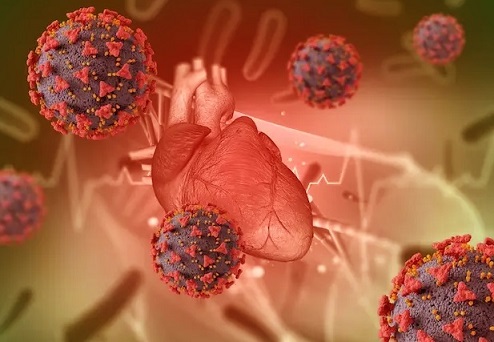Blocking the Kinin B1 Receptor Can Reduce Persistent Heart and Blood Vessel Issues Caused by COVID-19
Nikhil Prasad Fact checked by:Thailand Medical News Team Feb 22, 2025 1 month, 3 weeks, 8 hours, 7 minutes ago
Medical News: Long COVID, characterized by persistent symptoms following acute SARS-CoV-2 infection, has been associated with significant cardiovascular complications, including fibrosis, functional impairment, and chronic inflammation. Emerging evidence suggests that the kinin B1 receptor (B1R) plays a pivotal role in mediating these long-term cardiac pathologies. Thailand
Medical News hypothesizes that targeting the Kinin B1 Receptor can mitigate long-lasting heart complications of COVID-19
 Blocking the Kinin B1 Receptor Can Reduce Persistent Heart and Blood Vessel Issues Caused by COVID-19
The Kinin-Kallikrein System and B1R
Blocking the Kinin B1 Receptor Can Reduce Persistent Heart and Blood Vessel Issues Caused by COVID-19
The Kinin-Kallikrein System and B1R
The kinin-kallikrein system (KKS) is integral to various physiological processes, such as inflammation, blood pressure regulation, and coagulation. Within this system, kinins like bradykinin exert their effects through B1 and B2 receptors. Notably, while the B2 receptor is constitutively expressed, the B1 receptor is inducible and upregulated during inflammatory conditions. Activation of B1R has been linked to increased vascular permeability, inflammation, and fibrosis.
https://academic.oup.com/cardiovascres/article-abstract/48/2/194/330345
B1R's Role in Cardiovascular Complications
Studies have demonstrated that B1R activation contributes to various cardiovascular diseases. For instance, research indicates that B1R activation mediates neuroinflammation in hypertension, suggesting its involvement in cardiovascular pathologies.
https://www.sciencedirect.com/science/article/abs/pii/S1043661819306310
Additionally, B1R activation has been associated with vascular leakage and vasodilation, further implicating its role in cardiovascular dysfunction.
https://translational-medicine.biomedcentral.com/articles/10.1186/s12967-020-02342-8
B1R and COVID-19
The interaction between SARS-CoV-2 and the renin-angiotensin-aldosterone system (RAAS) disrupts the balance of the KKS, leading to increased levels of bradykinin and its metabolites. This dysregulation results in the upregulation of B1R, contributing to inflammation and vascular permeability observed in COVID-19 patients.
https://www.frontiersin.org/journals/immunology/articles/10.3389/fimmu.2022.909342/full
In a mouse model of long COVID, researchers observed persistent upregulation of B1R expression in cardiac tissues 28 days post-infection. This upregulation was associated with apoptosis, disrupted cardiomyocyte architecture, fibrosis, impaired gap junction integrity, and sustained inflammation. Pharmacol
ogical blockade of B1R in these mice restored gap junction integrity, reduced fibrosis and apoptosis, and mitigated inflammation and immune activation, highlighting B1R's critical role in long COVID-induced cardiac remodeling and damage.
https://journals.physiology.org/doi/abs/10.1152/ajpheart.00861.2024
Hypothesis: B1R Blockade as a Therapeutic Strategy
Given the evidence linking B1R activation to cardiovascular complications in long COVID, it is plausible to hypothesize that B1R inhibition could serve as a therapeutic strategy to alleviate these conditions. By blocking B1R, it may be possible to reduce inflammation, prevent fibrosis, and preserve cardiac function in patients suffering from long-term cardiovascular sequelae of COVID-19.
Kinin B1R inhibitors
Currently there are no approved drugs that function as Kinin B1R inhibitors. A few are in development stages undergoing clinical trials but many targeting the B1R tend to have efficacy issues.
https://www.mdpi.com/2813-2998/2/3/28
https://www.sciencedirect.com/topics/pharmacology-toxicology-and-pharmaceutical-science/bradykinin-b1-receptor-antagonist
Thailand
Medical News is exploring the usage of polyphenols and tannins from black tea and poppy seeds as potential Kinin B1 Receptor inhibitors.Silico studies, vitro studies and vivo studies involving murine models have to date shown positive results along with a small obervational studies in certain patients.
Conclusion
The kinin B1 receptor emerges as a significant mediator in the development of long-lasting cardiovascular complications following SARS-CoV-2 infection. Targeting B1R offers a promising therapeutic avenue to address the persistent cardiac pathologies associated with long COVID. Further clinical studies are warranted to explore the efficacy of B1R antagonists in this context.
For the latest COVID-19 News, keep on logging to Thailand
Medical News.
Read Also:
https://www.thailandmedical.news/news/dapagliflozin-as-a-treatment-for-sepsis-induced-cardiomyopathy
https://www.thailandmedical.news/news/short-chain-fatty-acids-and-their-role-in-heart-failure
https://www.thailandmedical.news/news/exosome-derived-micrornas-in-hypertrophic-cardiomyopathy
https://www.thailandmedical.news/pages/thailand_doctors_listings
Follow us on:
https://x.com/ThailandMedicaX
https://www.facebook.com/ThailandMedicalNews
https://bsky.app/profile/thailandmedical.bsky.social
https://gettr.com/user/thailandmedicalnews
https://www.tribel.com/thailandmedical/wall
and 33 other social media platforms
